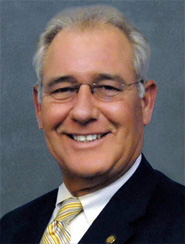Graham Will Get Say On Poarch Creek Slots At Gretna
January 29, 2016
The Florida Supreme Court on Thursday said former Gov. and U.S. Sen. Bob Graham can file a friend-of-the-court brief to oppose the possibility of slot machines at a Gadsden County pari-mutuel facility operated by the Poarch Creek Indians of Atmore.
 Graham, represented by former state lawmaker Dan Gelber, sought permission Wednesday to file a brief in a case in which Gretna Racing argues it should be allowed to offer slot machines.
Graham, represented by former state lawmaker Dan Gelber, sought permission Wednesday to file a brief in a case in which Gretna Racing argues it should be allowed to offer slot machines.
The 1st District Court of Appeal in October sided with Gov. Rick Scott’s administration, which contends that slot machines would require legislative approval. Gadsden County voters in 2012 approved a referendum aimed at allowing slots, and Gretna Racing argues it should be allowed to offer the lucrative machines.
The filing Wednesday said Gretna Racing opposed Graham’s request to file a brief. The Wednesday document said Graham will argue, in part, that Gretna Racing’s interpretation of state law “contradicts the Florida Constitution’s prohibition against lotteries.”
The Supreme Court’s Gretna decision could have wide-ranging implications because voters in Brevard, Hamilton, Lee, Palm Beach and Washington counties also have approved referendums seeking to allow slot machines.
by The News Service of Florida
Senate Panel, Headed By Evers, Looks For Death Penalty Fixes
January 29, 2016
A Florida Senate panel chaired by Greg Evers heard Wednesday from prosecutors, judges, public defenders and experts about how to fix the death-penalty process after the U.S. Supreme Court struck down the state’s capital sentencing structure this month.
The Senate Criminal Justice Committee workshop focused on the impact of the decision, known as Hurst v. Florida, which found the state’s system of allowing judges — not juries — to impose the death penalty is unconstitutional.
Much of the testimony from defense lawyers, judges and prosecutors also dealt with issues related to but not explicitly addressed in the Jan. 12 ruling.
The 8-1 decision was centered on what are known as “aggravating” circumstances that must be found before defendants can be sentenced to death. A 2002 U.S. Supreme Court ruling, in a case known as Ring v. Arizona, requires that determination of such aggravating circumstances be made by juries, not judges.
Under Florida law, juries make recommendations regarding the death penalty, based on a review of aggravating and mitigating circumstances, but judges ultimately decide whether defendants should be put to death or sentenced to life in prison.
Florida law also does not require that the jury recommendations to impose death sentences be unanimous, making the state an “outlier” compared to others with capital punishment, Bob Dunham of the Washington, D.C.-based Death Penalty Information Center, told the committee.
While Florida only requires a simple majority recommendation from juries, Alabama and Delaware — the only other states that do not require unanimity — both require at least nine jurors to vote in favor of capital punishment.
Being so outside of the mainstream puts Florida at risk in a future Supreme Court ruling, Dunham said.
Nearly all of the speakers Wednesday recommended that the Legislature require unanimous verdicts in death penalty sentences, as is required for all other verdicts under state law.
Capital Collateral Counsel for the Southern Region Neal Dupree said the lack of unanimity is “disconcerting” in death sentences.
“We require a jury to be unanimous in every other aspect of law, why shouldn’t a unanimous jury be required in this instance?” said Dupree, whose state-backed agency represents Death Row inmates.
O.H. “Bill” Eaton, a retired Florida judge and death penalty expert, told the panel that requiring unanimous verdicts in death penalty sentences would require jurors to be more deliberative.
“When you have a unanimous verdict, everybody’s got to work and they’ve got to come to grips with a decision,” Eaton said.
But Brad King, the state attorney for the 5th Judicial Circuit, which includes Ocala, said unanimous verdicts should be required for decisions regarding aggravating circumstances but not for whether the death penalty should be imposed. King suggested that 9-3 decisions for sentencing would suffice.
Allowing one juror “with no qualifications” related to the death penalty to prevent a death sentence would “give them absolute control over what that sentence is,” King said.
“You allow them to control the entire process,” he said.
 Evers, who represents the North Escambia area, assembled the speakers and asked them to make specific recommendations to the Legislature about how to fix the problem with the sentencing process.
Evers, who represents the North Escambia area, assembled the speakers and asked them to make specific recommendations to the Legislature about how to fix the problem with the sentencing process.
Florida Solicitor General Allen Winsor, who works for Attorney General Pam Bondi and who argued the Hurst case before the U.S. Supreme Court last fall, told the committee that his office did not have any suggestions about how the state should respond.
“You’re really not going to give us any recommendations?” Evers said.
Under questioning from Senate Minority Leader Arthenia Joyner, Winsor remained reticent.
“What he’s going to do is he wants us to come up with the decision and then they’re going to work with us on it,” Evers, R-Baker, said.
Lawmakers are also grappling with whether the Hurst ruling should apply retroactively to already-sentenced Death Row inmates, something the U.S. Supreme Court did not address in its ruling.
Dupree is representing Cary Michael Lambrix, a Death Row inmate scheduled to be executed on Feb. 11. The Florida Supreme Court will hear oral arguments in the case, including the impact of the Hurst decision, on Tuesday.
Dupree said Florida lawmakers should follow their own example in a 1972 law passed in anticipation of a U.S. Supreme Court decision in a case known as Furman v. Georgia that resulted in a nationwide moratorium on the death penalty. The law, still on the books, required that all death sentences be reduced to life imprisonment if a U.S. Supreme Court decision finds that the state’s death penalty statute is unconstitutional.
Sen. David Simmons asked the panel whether the 1972 law would have to be applied in the wake of the Hurst ruling, but received mixed responses from the experts.
Evers said the Senate will pass “some type of death penalty reform” during the legislative session. After the meeting, he said he intends to propose a measure that will require juries to impose death sentences and that it will also address how many jurors must decide on the sentence.
“I can’t guarantee it will be unanimous, but the numbers will change,” Evers said. “We’re going to look at it to where we don’t have to come back here and we can put Florida’s death penalty to rest.”
by The News Service of Florida
Sunny And Warming Into The Weekend
January 29, 2016
Here is your official North Escambia area forecast:
Tonight: Clear, with a low around 38. Southwest wind around 5 mph.
Saturday: Sunny, with a high near 71. South wind 5 to 10 mph.
Saturday Night: Patchy fog after midnight. Otherwise, partly cloudy, with a low around 49. South wind 5 to 10 mph.
Sunday: Patchy fog before 9am. Otherwise, mostly cloudy, with a high near 74. South wind 5 to 10 mph.
Sunday Night: Patchy fog after midnight. Otherwise, mostly cloudy, with a low around 55. South wind 5 to 10 mph.
Monday: Patchy fog before 9am. Otherwise, partly sunny, with a high near 74. Southwest wind 5 to 10 mph.
Monday Night: Partly cloudy, with a low around 60. Southeast wind 5 to 10 mph.
Tuesday: Showers and thunderstorms likely. Mostly cloudy, with a high near 73. South wind 10 to 15 mph, with gusts as high as 20 mph. Chance of precipitation is 60%.
Tuesday Night: Showers and thunderstorms. Low around 53. South wind 10 to 15 mph becoming northwest after midnight. Chance of precipitation is 80%.
Wednesday: A 20 percent chance of showers. Partly sunny, with a high near 59.
Wednesday Night: Partly cloudy, with a low around 36.
Thursday: Mostly sunny, with a high near 53.
Thursday Night: Mostly clear, with a low around 30.
Friday: Sunny, with a high near 56.
Open Carry, Stand Your Ground Measures Headed To House Floor
January 29, 2016
Three gun-related measures — including an open-carry proposal and another that would change the burden of proof in the state’s “stand your ground” law — are headed to the House floor for a full vote.
A proposal that would let the nearly 1.5 million people in Florida with concealed-weapons licenses openly display firearms in public received a thumbs-up at its final committee stop on Thursday. Later in the day, the Senate passed two other gun measures, including the “stand your ground” proposal (SB 344).
 The House will take up the self-defense measure after it receives the bill from the Senate, House Speaker Steve Crisafulli’s spokesman Michael Williams said in an email Thursday. A House version failed on a tie committee vote in November.
The House will take up the self-defense measure after it receives the bill from the Senate, House Speaker Steve Crisafulli’s spokesman Michael Williams said in an email Thursday. A House version failed on a tie committee vote in November.
The House Judiciary Committee approved the open-carry bill (HB 163) after rejecting an amendment with alternatives suggested by the Florida Sheriffs Association. Gun rights advocates argued the amendment wouldn’t stop people with concealed-carry licenses from being arrested for accidentally exposing a sidearm.
“To every extent that our citizens can take more responsibility for their own safety, we enhance the public safety of the collective society,” Rep. Matt Gaetz, a Fort Walton Beach Republican who sponsored the bill, told reporters after the meeting. “Of course, there are circumstances where people use firearms in a bad way, just like there are circumstances where people use other weapons in a bad way. I don’t think that’s the function of the law. I think that’s the function of the individual.”
Rep. Michelle Rehwinkel Vasilinda, a Tallahassee Democrat, joined Republicans on the committee in a 12-4 vote in favor of the proposal.
The committee tacked on an amendment that would require an openly carried gun to be in a holster, case or bag. The amended bill would also acknowledge that private employers can display written notices stating that possession of a firearm is prohibited.
The open-carry measure drew concerns from several lawmakers over its potential impact to tourism. Law enforcement officials are split on the proposal — the Florida Police Chiefs Association and some county sheriffs support it, while the Florida Sheriffs Association is opposed.
Lake Worth Democrat Rep. David Kerner argued that, with or without open-carry, concealed-weapon license holders can defend themselves now.
“Nobody wants this policy except a very small group of Floridians,” Rep. Dave Kerner, D-Lake Worth, said. “I don’t think we should jeopardize the image and safety of our state and law enforcement officers to appease a theory of constitutional law that is not accurate.”
Kerner, a former police officer, attempted to include language proposed by the Florida Sheriffs Association that would define measures for law enforcement when a concealed-weapons license holder inadvertently displays a sidearm.
But influential National Rifle Association lobbyist Marion Hammer dismissed concerns about the bill as “creative hyperbole.”
“Most license holders will never carry openly,” Hammer said. “But if they do they won’t cause a problem. And how do I know that? Because if they cause problems, they will lose their license and then they can’t carry concealed or openly.”
A Senate companion (SB 300) is awaiting a hearing by the Senate Judiciary Committee, where amendments similar to Kerner’s are expected.
The Senate, meanwhile, on Thursday sent a pair of gun-related bills to the House.
By a 24-12 vote, the Senate signed off on a measure (SB 344) that would alter the burden of proof in “stand your ground” self-defense cases.
Democrats contend the proposal will put an end to cases before all of the facts are fully revealed.
“It potentially stops an investigation cold after the last man standing tells his side of the story,” said Senate Minority Leader Arthenia Joyner of Tampa. “The dead do not have the opportunity to rebut the tale told by the survivor. In cases where there are no witnesses, this bill stacks the deck against the justice for the dead.”
The bill stems from a Supreme Court ruling last year that said defendants have the burden of proof of showing they should be shielded from prosecution under the “stand your ground” law. In “stand your ground” cases, pre-trial evidentiary hearings are held to determine whether defendants should be immune from prosecution. The measure, sponsored by Sen. Rob Bradley, would place the burden of proof on prosecutors in the evidentiary hearings.
Bradley, a former prosecutor, said the “fundamental tenet” of the criminal-justice system is that the state has the burden of proof in criminal proceedings.
“I think it’s simply incorrect to suggest that this bill will result in an otherwise guilty individual going free,” Bradley, R-Fleming Island, said. “If the state has sufficient evidence to successfully prosecute a defendant in a jury trial, the state will prevail in the immunity hearing before a judge and the judge will permit the case to go to trial.”
But Democrats argued that the measure would increase the likelihood of a repeat of the 2012 death of Trayvon Martin, a black 17-year-old who was shot by neighborhood-watch volunteer George Zimmerman in Sanford.
Zimmerman, who claimed he shot the teen in self defense, was not immediately charged. A jury later acquitted him of second-degree murder charges.
“We talk about the shifting of burden from the defendant on to the state. All I can do is think about how that (Zimmerman) trial played out and what I felt like when that jury verdict came down,” said Sen. Dwight Bullard, a Miami Democrat who is black.
Although the House version of the proposal (HB 169) failed on a tie vote in its only committee vetting last year, Williams said “the House will take up the (Senate) bill for consideration” when it receives the bill.
The Senate unanimously passed a second measure (SB 130) — dubbed the “backyard range” bill — intended to restrict the recreational discharge of a firearm in certain residential areas.
The measure prohibits the recreational discharge of a firearm outdoors, including for target shooting or celebratory shooting, in primarily residential areas with a density of one or more dwelling units per acre. A violation would be a first-degree misdemeanor punishable by up to a year in jail and a $1,000 fine.
A staff analysis of the bill pointed to reports about people constructing gun ranges in their backyards, with neighbors being concerned for safety. Law enforcement officials complained that they were hamstrung because their lawyers found the state statute barring “recklessly or negligently” discharging a firearm to be “subjective and vague.”
by Jim Turner, The News Service of Florida
Northview Grad Awarded Prestigious American FFA Degree
January 29, 2016
Courtney Solari, a 2014 graduate of Northview High School, has received her American FFA Degree, which is awarded to FFA members who have demonstrated the highest level of commitment to FFA. The degree is presented after the FFA member graduates from high school.
Less than half of one percent of all FFA members receive the American FFA Degree, making it one of the organization’s highest honors. The National FFA Organization provides leadership, personal growth and career success training through agricultural education to over a half million student members in grades seven through 12 who belong to one of 7,570 local FFA chapters throughout the U.S., Puerto Rico and the Virgin Islands.
Solari was unable to attend the FFA National Convention last October. The degree was presented to her Thursday by Northview FFA Advisor Perry Byars.
Pictured: Courtney Solari, left, receives her American FFA Degree from Northview FFA Advisor Perry Byars. Photo for NorthEscambia.com, click to enlarge.
James Oglesby
January 29, 2016
James “Fat Baby” Oglesby, was born June 6, 1943, unexpectedly passed away Monday, January 25, 2016, after a brief illness. He was 72 years old. James was proceeded in death by his mother, Frances Marie Oglesby and father, Nick Harold Oglesby.
He is survived by his beloved wife of 53 years, Elaine; brother, Jimmy Oglesby; four children, Terry Clark (Brian) of Beulah, Susie Peebles (Eric) of Pensacola, Johnny Oglesby of Flomaton, and Tammy Wentworth (Duane) of Pace; nine beautiful grandchildren, Amanda Watts, Adrian Cross, Anthony Cross, Ashley Cross, Alec Bailey, Alan Patti, Chad Wentworth, Jacobi Wentworth, and Meghan Oglesby; three step-grandchildren, Tucker Peebles, Jesse Peebles and Wyatt Peebles; ten great-grandchildren, Antonio Oglesby, Kristopher Brown, Aaliyah Smith, Seddrick Smith, Kalvin Smith, Kymani Merriweather, Molly Cross, Abbey Cross, and Avery Cross; two great-great-grandchildren, Kaliyah Oglesby and Kristopher Brown Jr.
James was born and raised in Pensacola. At the age of 13, James began playing music. Music was his passion and he went on to become a professional musician for 60 years. James retired from Bellsouth AT&T after 35 years. He was a past Worshipful Master of The Brentwood Masonic Lodge and was a 32nd degree Mason. James also was a proud member of the Directors Staff Band at the Shriners Hadji Temple. James was a dignified member of the Warrington Elks Lodge 2108. James was a devoted outdoorsman and his hobbies included hunting and fishing, but mostly spending time with cherished grandchildren, family, and friends. James never met a stranger and will be greatly missed by anyone who knew him.
Pallbearers will be Adrian Cross, Anthony Cross, Ashley Cross, Alan Patti, Chad Wentworth, Jacobi Wentworth, Antonio Oglesby and Kristopher Brown.
Honorary pallbearer will be Alec Bailey.
Funeral services were held Friday, January 29, 2016 at Faith Chapel Funeral Home North.
Interment was in Sardis Baptist Cemetery in Wawbeek, AL.
Faith Chapel Funeral Home North is in charge of arrangements.
Margaret Lula Pike Ambrose
January 29, 2016
Margaret Lula Pike Ambrose, 83, of Pensacola, passed away on Monday, January 25, 2016. She was born in Clemson, SC.
She is preceded in death by her parents, Lawrence and Velma Pike of Clemson, SC; sisters, Betty Sue Pike and Helen Drew of Clemson, SC and Mary Toensing of Minneaspolis, MN.
She is survived by her loving husband of 62 years, Eugene Joseph Ambrose; twin sons, Keith L. Ambrose (Bernadette) and Karl J. Ambrose (Marla); daughters, Laura Cook (Greg) and Kara Britt (David); eight grandsons, Aaron, Jeremy, Joshua, Ryan, Carl, Kyle, Charles and Joseph; granddaughters, Danielle, Courtney and Caroline; great-grandsons, Austin, Griffin, Collins, Braden and Brock; great-granddaughters, MacKenzie, Leighton, Reese and Anniston; and sister, Evelyn Pike of NY.
Pallbearers will be her grandsons and honorary pallbearers will be Gregory Cook, Jeff Fischer, James Fischer, Diana Fischer, John Toler, Jamie Kintz, David Britt, David Denadel and Raymond Goodwin.
Margaret was a loving military wife and mother who was an active auxillary member to several military associations to this day. She assisted military chaplains, the last being at Ellyson Station here in Pensacola. She was a loving mother to her four children and 11 grandchildren. She was always helping in their various athletic programs, swimming, baseball and football. She loved gardening, especially her flowers. Her dog, German shepherd, Sparky, was special to her like all her pets.
In lieu of flowers, memorials may be made to Catholic Charities or Covenant Hospice in Margaret’s memory.
Mass of Christian Burial was held on Thursday, January 28, 2016, at Nativity of Our Lord Catholic Church.
Interment was at Barrancas National Cemetery.
Faith Chapel Funeral Home North is in charge of arrangements.
Three Juveniles Steal School Bus, Take It On 35 Mile Joyride
January 28, 2016
Three juveniles were arrested Wednesday night after they stole a full-sized school bus and drove it around Pensacola for almost three hours.
 Brian Wilson, 11; Tyvon Sinclair, 11, and Catrina Montgomery, 14, all of Pensacola have been charged with grand theft of a motor vehicle.
Brian Wilson, 11; Tyvon Sinclair, 11, and Catrina Montgomery, 14, all of Pensacola have been charged with grand theft of a motor vehicle.
Detective Christopher Forehand said the incident began around 7:30 p.m. when the juveniles found the door open and key in the ignition of a school bus parked at Jacqueline Harris Preparatory Academy, 1408 E. Blount St.
Forehand said Wilson started the bus and then drove it off the school grounds. The juveniles drove the bus around Pensacola – including on Interstate 110 – before a man called police to report it for being driven recklessly. The man said he was following the bus and that the driver was running over curbs and repeatedly driving in the opposing lane.
Two Escambia County Sheriff’s deputies stopped the bus around 10:15 p.m. in the 700 block of South Navy Blvd. near the front entrance to the Pensacola Naval Air Station. Wilson was driving the bus at the time. Forehand said the investigation determined all three juveniles drove the vehicle during a 35-mile trip around Pensacola.
All three juveniles were transported to the Department of Juvenile Justice after they were arrested.
Train Blocks Numerous Cantonment Crossings
January 28, 2016
A stopped CSX train in Cantonment blocked numerous crossings this morning along Highway 95, including Countri Lane and Woodbury, for hours.
Officials say that according to CSX the train was “incapacitated”. The train was moved south, unblocking all crossings in the Cantonment area by 12:45 p.m.
Residents trapped in their neighborhoods said that the train was there since about 7 a.m. While the crossings were blocked, Escambia Fire Rescue was unable to get a fire truck to a reported medical emergency on Woodbury; however, the call turned out to be a false alarm.
Senate Unveils Boost In Educaton Spending
January 28, 2016
Senate budget writers are considering a larger education spending increase than Gov. Rick Scott sought, though lawmakers are still considering how to offset an increase in local property taxes that helps pay for the historic number.
The initial proposal from the Senate Education Appropriations Subcommittee would boost funding for the main public-school spending formula by almost $650.6 million in the year beginning July 1, more than the $507.3 million increase that Scott has touted as record-breaking.
The Senate amount would allow the state to spend $7,249.23 a student, against the $7,220.59 figure Scott has proposed. Either number would break the previous record for public-school spending on a per-pupil basis, set nine years earlier, before the financial crisis wrecked the state’s budget.
But Sen. Don Gaetz, a Niceville Republican who chairs the education budget panel, cautioned against reading too much into the number. Gaetz has raised questions about the spending increase’s reliance on rising local property taxes, which are part of the state funding formula.
“This is an area right here … where you may very well see some changes in our approach to it and in the numbers, depending upon our ongoing work and analysis,” Gaetz said.
Tax rates would remain flat under Scott’s plan and the Senate’s proposal, but so far the funding includes the increase in revenues from rising property values. Some lawmakers argue that the distinction doesn’t mean much to homeowners who will end up paying more regardless.
Gaetz’s committee has discussed three approaches to equaling out the increase in state and local funding. One option would be to boost state spending along with local funding, another would be to increase state funding to offset local tax dollars, and a third would be to simply lower local property taxes.
“We’re looking for a way to achieve increased funding for our K-12 schools without creating a property tax increase that is disproportionate,” Gaetz told reporters after the meeting.
The proposal released Tuesday would fall well short of completely evening out state and local spending on education, but more resembles that approach than the other two.
The plan would also increase spending on after-school or mentor programs by $10 million, to $30 million, while putting funding for those activities into a competitive grant system.
The Senate spending outline would provide less than Scott does in performance funding for state universities — $475 million, compared to $500 million from the governor — and the same $60 million for performance funding at state colleges. Gaetz is also floating spending $25 million to overhaul the funding formula for state colleges.
The subcommittee is hoping to firm up the numbers before meeting Thursday and sending its final recommendations to the full Senate Appropriations Committee.
by Brandon Larrabee, The News Service of Florida




